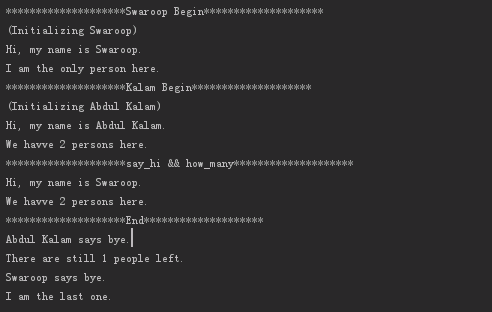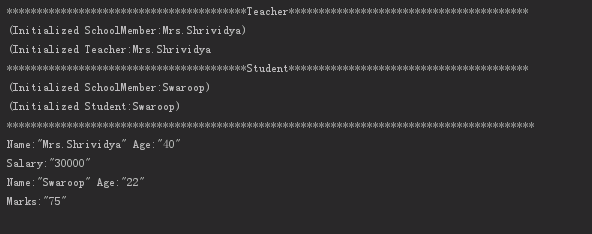简明Python教程学习笔记7
11、面向对象的编程
(1)简介
略
(2)self
假如你有一个类称为MyClass和这个类的一个实例MyObject。
当你调用这个对象的方法MyObject.method(arg1, arg2)的时候,
这会由Python自动转为MyClass.method(MyObject, arg1, arg2)——这就是self的原理了。
(3)类
略
(4)对象的方法
略
(5)__init__方法
略
(6)类与对象的变量
类的变量 由一个类的所有对象(实例)共享使用。只有一个类变量的拷贝,所以当某个对象对类的变量做了改动的时候,这个改动会反映到所有其他的实例上。
对象的变量 由类的每个对象/实例拥有。因此每个对象有自己对这个域的一份拷贝,即它们不是共享的,在同一个类的不同实例中,虽然对象的变量有相同的名称,但是是互不相关的。

1 # coding=utf-8 2 class Person(object): 3 """Represents a person.""" 4 population = 0 # 类变量 5 6 def __init__(self, name): 7 """Initializes the person's data.""" 8 self.name = name # 实例变量 9 print "(Initializing %s)" % self.name 10 11 # When this person is created, he/she 12 # adds to the population 13 Person.population += 1 14 15 def __del__(self): 16 """I am dying.""" 17 print "%s says bye." % self.name 18 19 Person.population -= 1 20 21 if Person.population == 0: 22 print "I am the last one." 23 else: 24 print "There are still %d people left." % Person.population 25 26 def say_hi(self): 27 """Greeting by the person. 28 29 Really, that's all it does.""" 30 print "Hi, my name is %s." % self.name 31 32 def how_many(self): 33 """Prints the current population.""" 34 if Person.population == 1: 35 print "I am the only person here." 36 else: 37 print "We havve %d persons here." % Person.population 38 39 40 if __name__ == "__main__": 41 print "*" * 20 + "Swaroop Begin" + "*" * 20 42 swaroop = Person("Swaroop") 43 swaroop.say_hi() 44 swaroop.how_many() 45 46 print "*" * 20 + "Kalam Begin" + "*" * 20 47 kalam = Person("Abdul Kalam") 48 kalam.say_hi() 49 kalam.how_many() 50 51 print "*" * 20 + "say_hi && how_many" + "*" * 20 52 swaroop.say_hi() 53 swaroop.how_many() 54 55 print "*" * 20 + "End" + "*" * 20
输出:

(7)继承

1 # -*- coding:utf-8 -*- 2 3 4 class SchoolMember(object): 5 """Represents any school member.""" 6 7 def __init__(self, name, age): 8 self.name = name 9 self.age = age 10 print "(Initialized SchoolMember:%s)" % self.name 11 12 def tell(self): 13 """Tell my details.""" 14 print "Name:\"%s\" Age:\"%s\"" % (self.name, self.age) 15 16 17 class Teacher(SchoolMember): 18 """Represents a teacher.""" 19 20 def __init__(self, name, age, salary): 21 SchoolMember.__init__(self, name, age) # 调用父类的初始化 22 self.salary = salary 23 print "(Initialized Teacher:%s" % self.name 24 25 def tell(self): 26 SchoolMember.tell(self) # 通过类调用父类的方法,不需要创建对象 27 print "Salary:\"%d\"" % self.salary 28 29 30 class Student(SchoolMember): 31 """Represents a student.""" 32 33 def __init__(self, name, age, marks): 34 SchoolMember.__init__(self, name, age) 35 self.marks = marks 36 print "(Initialized Student:%s)" % self.name 37 38 def tell(self): 39 SchoolMember.tell(self) 40 print "Marks:\"%d\"" % self.marks 41 42 43 if __name__ == "__main__": 44 print "**" * 20 + "Teacher" + "**" * 20 45 t = Teacher("Mrs.Shrividya", 40, 30000) 46 47 print "**" * 20 + "Student" + "**" * 20 48 s = Student("Swaroop", 22, 75) 49 50 print "**" * 44 51 members = [t, s] 52 for member in members: 53 member.tell()
输出:





